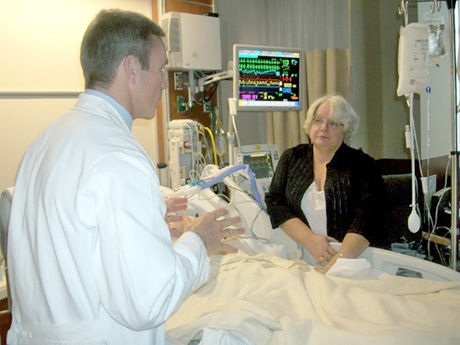Hi, it’s Patrik Hutzel from INTENSIVECAREHOTLINE.COM where we instantly improve the lives for Families of critically ill Patients in Intensive Care, so that you can make informed decisions, have PEACE OF MIND, real power, real control and so that you can influence decision making fast, even if you’re not a doctor or a nurse in Intensive Care!
This is another episode of “YOUR QUESTIONS ANSWERED” and in last week’s episode I answered another question from our readers and the question was
You can check out last week’s question by clicking on the link here.
In this episode of “YOUR QUESTIONS ANSWERED” I want to answer a question from one of my clients Isabel as part of my 1:1 consulting and advocacy service! Isabel’s husband is critically ill in ICU and the ICU team gives sedation to her husband to make him feel comfortable. Isabel is asking if that is also a way of euthanizing him.
The ICU Team Gives Sedation to My Husband to Make Him Feel Comfortable But Is it True That it is Also their Way of Euthanizing Him?

“You can also check out previous 1:1 consulting and advocacy sessions with me and Isabel here.”
Isabel: And I can see where that, with faith would be kind of, we’re playing God by saying, go ahead and take his life. Versus if he were to pass, like if his body stopped on its own and that happened then, okay, that happened. That’s different. But if we’re to say yes, go ahead and let him go. Don’t support him. His body isn’t shutting down. It’s just them removing the support. We are euthanizing him. Like they do to animals, putting them to sleep.
Patrik: But the problem is nobody’s using the word euthanasia in ICU. If anything, if you were to say to them, you’re euthanizing a patient, they would go up in arms because in most countries, euthanasia is illegal, including in the U.S.
Helga: Yeah, you’re right. I didn’t even think of it that way. You’re right.
Patrik: That’s why I asked you the question. Are you a religious family? Once the decisions have been made it’s too late.
RECOMMENDED:
Isabel: Yeah. I did tell her what the next steps are and she said that they give them fentanyl.
Patrik: Yeah. Euthanasia
Isabel: And Fentanyl. I mean doesn’t it like, kills you. Right?
Patrik: Oh, absolutely. Absolutely.
Isabel: She made it seem like that’s not what we were doing.
Patrik: So the deal, she makes it look like it’s no big deal.
Helga: Yeah.
Patrik: I think it is a big deal.
Isabel: Eli, do you have any input on this? Like thoughts?
Isabel: Are you still there?
Helga: So when she told you that, when she said that to you, what did you say to her?
Isabel: I told her, so you’re not killing him. Are you, are you using a drug to like slow down his heart? Are you using something to kill him? And she said, no, but I know Fentanyl. I know that I know the drugs.
Helga: So she was a dishonest then?
Isabel: Well, that was her answer, that we just use Fentanyl to make them more comfortable. And in no way, do we try to stop their heart and we just kind of let them pass on their own.
Helga: That doesn’t make sense.
Patrik: That’s inaccurate, the main side effect of Fentanyl is basically makes people stop breathing, Morphine, Fentanyl, very strong painkillers, very powerful painkillers. And they, the main side effect is it stops people from breathing.
Isabel: And she said something about Ativan?
Patrik: Ativan, Versed, the whole mix. Usually it’s a cocktail of either Morphine or Fentanyl, Versed and Ativan. It’s usually that mix.
Helga: Well, I definitely am in disagree with doing that to him. Because I do feel like then we’re playing God and saying, okay, it’s time now and I don’t think that’s okay.
Isabel: So what do we do? I mean, we keep him in a vegetative state?
Helga: No, that’s not what I’m saying, but even the doctor said, give him a little bit more time just to see.
Isabel: No, I know that but I’m looking at a month down the road.
Helga: Like future?
Isabel: Yeah.
Helga: Well, in that situation, then I would say if his heart stopped or something, then I would say, okay, then we don’t resuscitate because now his body is shutting down. Not us shutting him down.
Eli: I’m back.
Isabel: I see what you’re saying,
Helga: But us to put, make the decision of okay, it’s today and then you slowly watch him leave. I think that’s not okay. But again, if his body, but I also don’t want to, I’m nervous of, I mean, how does this work Patrik? If you approve a DNR, do they then not watch him? Like, is that something that can happen?
Patrik: No, no. He should get full care and treatment besides cardiac compressions, in case of another cardiac arrest of the beat. Does that make sense? You would not receive cardiac compressions in cases, heart stops, but everything else he should receive. If he has an infection and he needs antibiotics, you should be getting antibiotics.
Isabel: Okay. The DNR is just if his heart stops.
Patrik: Yeah. Unless they want to exclude other things as well. For example, you could exclude antibiotics for an infection. You could do that.
Eli: I have a question.
Isabel: Eli, did you catch the part about the euthanasia though?
Eli: Yes, I did.
Isabel: Okay.
Eli: I have a sense that maybe because he’s in ICU, there may be “Oh, we need to hurry him out of here. We need to remove, make room for other people.” Is there another section in the hospital where he can go where time is no limit? He can just be there for as long as he needs to be without having to make room for more people. You know what I’m saying?
Patrik: Oh, look, absolutely a big driver. Everything that’s happening in ICU is driven by timelines. So you’re spot on there. If he was to have a tracheostomy and he was to go to, what’s called an LTAC, there are timelines too. Those timelines are longer. The only place where there are no timelines is usually home care or nursing homes. But then the level of care, especially in nursing homes, even in LTACH is pretty bad. Yes, there may be a step down area in the hospital we can go, where he can more or less get more time. But even that comes with timelines.
RECOMMENDED:
Eli: Okay but now we’re going back to the issue, is he going to be like that for the rest of his life? And how long are we? I mean, I’m sure we’re willing to be there for as long as it takes, but now his quality of life is on the machine and in the bed, the rest of his life.
Patrik: Those are the predictions.
Eli: And I’m okay with that. Isabel, if you need help, when you want the family to help you do this, I’m here. I’m there.
Isabel: Patrik was saying the other day that sometimes we don’t know where they’re going to take him. It could be two hours from here. Noel was the sole provider for his family for the past, I don’t know how long now and I have not worked for nine years. So I have to start working pretty soon and I just don’t want to be put in a situation where he’s so far away that I can’t even go see him.
Eli: Yeah. On the concept of the DNR or do the euthanization, what’s the difference in us saying, you know what? We just want to take them off the ventilator or the respirator and see if he can breathe on his own or not breathe on his own and if he doesn’t breathe on his own, then he’ll pass naturally.
Isabel: That’s exactly what’s going to happen though, is if they do take them off the ventilator, that’s what she was trying to say. Like once they take off the ventilator that they have to give them something to help the pain, I guess. So that’s kind of like…
Helga: That’s killing him though. Yeah. So I don’t, we don’t, that’s not, if we’re going to okay. After that, we need to find out the MRI results report. We need to get a second opinion from the neurology and then like Patrik said, we need to then ask if we can get him a tracheostomy, because that’s going to be the next step in getting him off the ventilator with still some type of breathing support to see, is he going to wake up or not? The thing is we were discussing was, and I’m a strong no against giving him any, I don’t want to kill him. I don’t want to take them off anything. That’s going to kill him if he were to stop on his own. Because even on ECMO, I didn’t know this. But Patrik had said he could have even died on ECMO just because it was supporting him, his heart could’ve stopped or all these other things.
Helga: So if that would happen, then I understand not resuscitating him and letting him pass. Cause I feel like, okay, God’s in control of that, but I don’t want to be in a situation where we’re the ones calling the shots as to go ahead and take his life. Now, even though they just lied to Isabel and told her, “no, we’re not killing him.” When she asks them, is Fentanyl going to kill him? She said, no, it just makes them more comfortable. And that’s not true. It kills him. It makes him stop breathing and he dies.
Eli: Yeah they can’t stay that.
Isabel: So that’s not cool. But they did. That’s what Isabel asked, so this is just an example of no they can’t do it without our permission.
Patrik: Yeah. But it’s common practice.
Eli: They can’t outright say they’re going to kill him. No.
Helga: Right. But the thing is that’s so I feel like dishonest. Just say the way it is. It’s going to make them stop breathing.
Patrik: Yeah. ICU’s are very good at using euphemisms. It’s sort of saying we’re making people comfortable at the end of the day they’re euthanizing people.
Helga: I mean all I can think about is the way they put animals to sleep. That’s all I can get in my head. Just make them comfortable.
Patrik: Okay. Can I just elaborate on your question Eli? You had a very good question. You were saying what would happen if they just took him off the ventilator, take out the breathing tube. I’ll tell you what would happen. Most likely he would suffocate in his own sputum. He would probably swallow saliva in his lungs and then more or less suffocate, that would be a horrible death. Right? And I’ll tell you why I believe this would happen because he’s got a brain injury. He can’t swallow and because he can’t swallow. As soon as they take the breathing tube out, saliva would go down in his lungs and he would end up with pneumonia.
Patrik: He would then either need to go back on a ventilator or he would more or less suffocate drown in his own sputum. You might remember this morning, Isabel, or this afternoon, your time when she was talking about, I think she was talking about a tracheostomy. She admitted that with a brain injury, we probably would need a tracheostomy to maintain the airway long-term because the tracheostomy would protect his airway. He may not need a ventilator, but he will need a tracheostomy most likely cause he can’t swallow. The tracheostomy would protect the airway.
Eli: Okay.
Isabel: So he would need that for the rest of his life.
Patrik: I’m almost bound to say yes, but that doesn’t mean he needs a ventilator, but the tracheostomy I believe is it’s pretty much a given.
Eli: Wow.
Helga: So he would need the tracheostomy for the rest of his life?
Patrik: I would say with the information that I have so far, I would say pretty much.
Isabel: You see? And I can’t see your brother like that.
Helga: I know. But even with that, so what does that mean guys What does that come to? Because I just can’t get behind saying, how do I say this? I can accept it if he passes on his own, like his heart stops or something I can, if his kidneys fail, I don’t know, something. I can accept that. But I just, even though he’s on a tracheostomy or whatever, if his body is still alive, I don’t know. It’s just really difficult to say. So what does that mean? Because he’s on the tracheostomy. You’re going to say, okay, then just let him like give him the fentanyl. Like that’s what I, I don’t know.
Eli: No. I would say..
Isabel: It’s just, I’m trying to, I’m trying to honor what he would want. What quality of life he would want. And that’s the hard part, because I was married to him for 21 years. I spent the most time with him out of anyone. His whole life was with me and I know he would not want a tracheostomy for the rest of his life. He would not want get that.
Helga: I get that. I do. I do understand that. And I agree. I know he wouldn’t want that. I’m just saying right now, we’re not even at that step yet because we still want to get a second opinion. We still want to verify the MRI results and we still want to hopefully get the tracheostomy just to get him off the ventilator. Those are like the series of steps. We’re not even at the rest of his life. We’re not even at two months of him being in ICU. We’re barely one month. He just got off ECMO a few days.
Eli: Yeah. That’s my thoughts.
Isabel: Yeah I do understand what you’re saying. But we do have to look at the longevity, the picture, full picture. Not just take baby steps because we’re not in a baby step situation anymore. You know, we’re not.
RECOMMENDED:
Eli: Let me add, can I answer that though? What you’re saying about, you knowing Noel for the longest and you know that he wouldn’t want to be with a tracheostomy, if that is true, that’s not for us to decide, that’s for that, if we truly believed that God is in control we have to do, we have to put God first and do what is ultimately the good or for the good, and that would be to do the tracheostomy and let him live. And even though he wouldn’t want to live that way, I believe that, that’s the right thing to do and, and take care of them and be there for him and let God be in control. Whether or not he continues to live. You know, I just don’t see us doing it any other way, but that’s, that’s me.
Helga: I mean, biblically and morally. I mean, I understand it. And I agree with that even though I don’t think he wants it and that’s where you go into the reason there’s so many debates on euthanasia because some people will say, well, Patrik has example where people with cancer there’ll be just tell me just, I give you permission to give me like suicide. That’s basically what it is.
Eli: We can’t do that.
Isabel: And that’s why I feel like with my faith, I just don’t have good conscious of that. I believe if he’s not going to come out of it, then, then he would just, I would pray that God would, we’ve all prayed. Like then just like take him home Lord. But if there’s still been these other little things that have happened, that I’m still have some hope, but I would also have peace if he went away on his own, rather than us being the ones to make that decision. And I feel we need to think about those things and the future gen, but there’s just no way I can be agree to putting him down like that.
Eli: Let me ask you this. Have you and Noel ever talked about having will?
Isabel: No, but we did talk about, we talked about how he would want his funeral. Yeah. We did talk about him not being on machines to survive. You don’t want to live like that. Those are things that we did talk about. He’s like, no, just call it a wrap. Let me go. I don’t want to be on machines to make me survive.
Eli: Okay. Now let me ask Patrik, can I ask you a question now, if there was a will and in that, in that will he had stated that he wouldn’t want, that he would rather have the DNR or the whatever you call it. Would we have a choice or would the will supersede our decision right now? Like we’re doing debating.
Patrik: Yeah.
Helga: The will would oversee.
Patrik: I believe that the will would supersede that.
Patrik: Believe that the will would supersede that but it might also depend in your state law. I’m not a lawyer. It really depends, from what I understand, state by state, country by country.
Eli: Okay. So what I’m getting to is that for whatever reason, God’s plan, that didn’t happen there wasn’t a will there wasn’t anything in place that supersedes our communicating as a family and deciding for him, even though he doesn’t want to live like that. Right now, we are at a crossroads where we it’s up to us, and I know that he wouldn’t want to live that way, but our decision is to put God first and what is good and that’s to do the trick and continue to have him live. And not do the euthanization fantastic question.
Patrik: Fantastic question, Eli. I think I can give you an answer to that and I would have brought it up later anyway, but I think now is the time to sort of look at that. I do believe part of the discussion needs to be to talk to palliative care. You might remember on the first meeting that I attended with you, we had palliative care on the call. There was the ICU and then there were two people from palliative care. Do you all know what palliative care means?
Isabel: Yeah. It’s end of life.
RECOMMENDED:
Patrik: Can be, it’s more like.
Helga: I thought it was pain management.
Patrik: Pain management and it can be end of life management. I do strongly feel like with what you said, Eli. Let’s just say you decide for a tracheostomy, but then also have a plan for end-of-life if you feel like after six months, after 12 months, okay. This is definitely not what you want for Noel. Have a plan and get palliative care involved early and have a plan for lack of a better term, have an exit plan. I know that’s a horrible word for lack of a better term, but in order to bring things to a conclusion and in order to explain. Have a plan B.
Eli: Yeah, I understand.
Patrik: Right and we’re running a service in the community where we provide palliative care in the community for patients with tracheostomy ventilation. We provide end of life care at home. That doesn’t help you where you are, but there might be similar services where you are.
Eli: I just think in my heart that our intentions are good. God will take care of the rest and there’s no gray area in that. God is ultimately in control, but we have to do what’s in the greater good.
Patrik: You, as a family, need to feel comfortable.
RECOMMENDED:
Eli: Yeah. That’s my opinion and Noel doesn’t want to hear that, but.
Isabel: I’m trying to listen to you guys and I’m trying to listen to my kids too. And it’s hard for me. I’m listening to your mom, your sister, you, and my kids have a totally different opinion than you do.
Eli: What are they saying? Let him go?
How can you become the best advocate for your critically ill loved one, make informed decisions, get peace of mind, control, power and influence quickly, whilst your loved one is critically ill in Intensive Care?
You get to that all important feeling of making informed decisions, get PEACE OF MIND, CONTROL, POWER AND INFLUENCE when you download your FREE “INSTANT IMPACT” report NOW by entering your email below!
In Your FREE “INSTANT IMPACT” report you’ll learn quickly how to make informed decisions, get PEACE OF MIND, real power and real control and how you can influence decision making fast, whilst your loved one is critically ill in Intensive Care! Your FREE “INSTANT IMPACT” Report gives you in-depth insight that you must know whilst your loved one is critically ill or is even dying in Intensive Care!
Sign up and download your FREE “INSTANT IMPACT” REPORT now by entering your email below! In your FREE “INSTANT IMPACT” REPORT you’ll learn how to speak the “secret” Intensive Care language so that the doctors and the nurses know straight away that you are an insider and that you know and understand what’s really happening in Intensive Care! In your FREE report you’ll also discover
- How to ask the doctors and the nurses the right questions
- Discover the many competing interests in Intensive Care and how your critically ill loved one’s treatment may depend on those competing interests
- How to Eliminate fear, frustration, stress, struggle and vulnerability even if your loved one is dying
- 5 mind blowing tips & strategies helping you to get on the right path to making informed decisions, get PEACE OF MIND, control, power and influence in your situation
- You’ll get real world examples that you can easily adapt to you and your critically ill loved one’s situation
- How to stop being intimidated by the Intensive Care team and how you will be seen as equals
- You’ll get crucial ‘behind the scenes’ insight so that you know and understand what is really happening in Intensive Care
- How you need to manage doctors and nurses in Intensive Care (it’s not what you think)
Thank you for tuning into this week’s YOUR QUESTIONS ANSWERED episode and I’ll see you again in another update next week!
Make sure you also check out our “blog” section for more tips and strategies or send me an email to [email protected] with your questions!
Also, have a look at our membership site INTENSIVECARESUPPORT.ORG for families of critically ill Patients in Intensive Care here.
Or you can call us! Find phone numbers on our contact tab.
Also check out our Ebook section where you get more Ebooks, Videos and Audio recordings and where you can also get 1:1 counselling/consulting with me via Skype, over the phone or via email by clicking on the products tab!
This is Patrik Hutzel from INTENSIVECAREHOTLINE.COM and I’ll see you again next week with another update!







